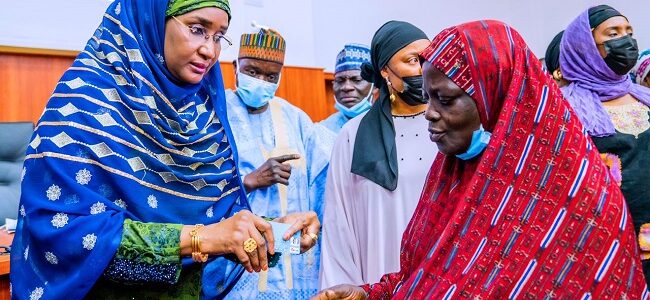
The Federal Government, on Thursday, commenced the disbursement of the second phase of the Conditional Cash Transfer (CCT) nationwide, as part of ongoing efforts aimed at alleviating the socio-economic.
The Minister of Humanitarian Affairs, Disaster Management and Social Development, Sadiya Umar Farouq who flagged off the ‘Recommencement of payment to beneficiaries of Household Uplifting Programme -Conditional Cash Transfer (HUP-CCT)’ in Abuja, applauded the World Bank support since 2016.

Tribune Online gathered that each beneficiary who is expected to receive the sum of N5,000 for one month will get a lump sum of N20,000 for a period of four months through the use of the Debit Card.
The Minister explained that a total number of 23,893 beneficiaries across Abaji, Kuje and Kwali Area Councils will benefit from the programme.

She explained that the programme was “designed and developed a safety nets programme for Nigeria under a broad-based platform of the National Social Safety Nets Project (NASSP). One important component of the project is the Household Uplifting-Conditional Cash Transfer (HUP-CCT) administered under a National Cash Transfer Office (NCTO) to deliver financial support to poor and vulnerable households (PVHH) nationwide.
“To enhance the effectiveness of the project and ensure fairness, a National Social Safety Net Coordinating Office (NASSCO) was also established under the NASSP to transparently deploy an innovative strategy to dynamically capture data on all poor and vulnerable households in the country into a well-managed National Social Register (NSR). This register is built using a community base targeting mechanism where the community members themselves determine the poor of the poor and most vulnerable households amongst themselves.
“HUP-CCT beneficiaries are then mined from this database using a standardised eligibility criterion, and granted with a monthly stipend to achieve the following key objectives: improved household consumption; increase in the utilisation of health and nutrition services; improve school enrolment and attendance; improve environmental sanitation and management; improve asset and financial acquisition and ensure that beneficiaries are engaged in sustainable livelihood activities. With the flag-off today, payments will recommence in all participating States in the country.”
According to her, the implementation process which was halted became necessary because of a change in administration/management; tweaking of payment modalities to respond to cashless realities, security concerns and digitisation of the payment processes for improvement and enhanced service delivery, ensuring value for money, transparency and accountability; and most importantly the effects of restrictions on mass gathering as a result of the COVID-19 pandemic.
Under the new arrangement, the “Ministry has directed the NCTO to proceed with a phased migration of the beneficiaries from offline payment systems to open online systems using accounts opened by licensed Payment Service Providers (PSPs) that include Commercial Banks, Microfinance Banks, Payments Service Banks and Mobile Money Operators.
“With this development, beneficiaries can access or control their accounts through the use of Personal Identification Numbers (PIN), perform all transactions like withdrawal, bank transfers and bill payments etc. For now, 25% of the beneficiaries are targeted and we will gradually extend this to all beneficiaries as far as industry constraints would allow.”
In her address, the Coordinator of the Conditional Cash Transfer Programme, Hajiya Halima Shehu thanked the minister for the recommencement of the programme which has now been upgraded for transparency and equity.
“This program focuses on digitisation and financial inclusion. The honourable minister must be commended for her relentless efforts in transforming the Conditional Cash Transfer Programme from the one that brings beneficiaries’ stipends through virtual accounts to the one that is now transactional with features for savings, withdrawals and transfer of funds. This will enable the beneficiaries to have sustainable transactional accounts to meet the current economic realities,” Shehu said.
In his remarks, NSIPs National Coordinator, Dr Umar Bindir, urged the beneficiaries to make good use of the stipends and also borrow interest-free loans from the revamped Government Enterprise Empowerment Programme GEEP 2.0 which was launched on Tuesday.
The CCT which is an approved partnership with the World Bank was designed and developed as a safety nets programme for Nigeria under a broad-based platform of the National Social Safety Nets Project (NASSP).
Credit: Nigeria Tribune
